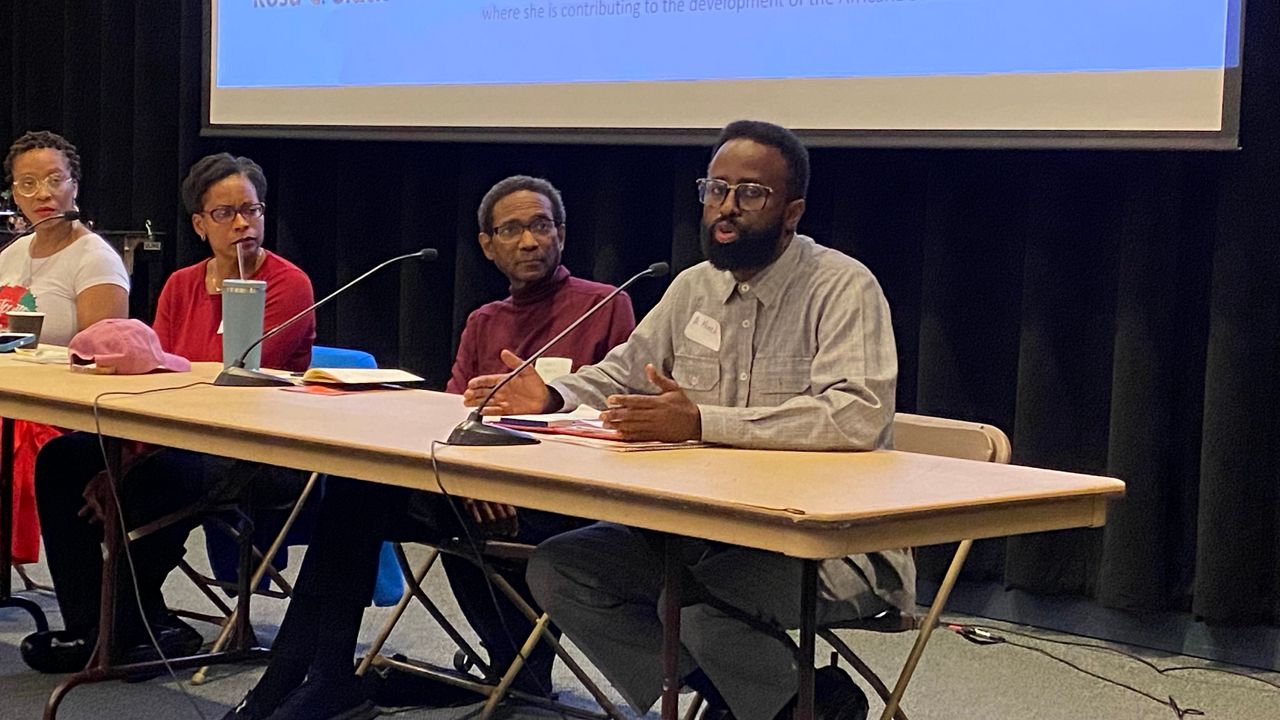Hundreds gathered in Portland Monday for the State of Black Maine Symposium, a daylong Juneteenth event designed to amplify Black voices and address racial disparities.
The gathering at the University of Southern Maine featured panel discussions about what it was like to be Black growing up in Maine and the state of Black industry, justice and education.
Black-owned businesses showed off their products and the day highlighted prayers, song, poetry, food and live performance.
It was the first of what’s expected to be an annual gathering on Juneteenth, a state and federal holiday that commemorates the day in 1865 when troops arrived in Texas to free the slaves two and a half years after the signing of the Emancipation Proclamation.
“We’re here to celebrate Juneteenth, which is historical, but in many ways we’re just one generation removed from some of the things that really have affected Black and brown people in America,” said Larissa Malone, associate professor and chair of the teacher education department at the University of Southern Maine.
Malone’s comments came during a panel discussion on the state of Black education in Maine, which highlighted the incorporation of African American studies in Portland Public Schools.
“We’re moving away from the historical white narrative we’ve always been given,” said Rosa Slack, an educator in the Portland schools. “It’s really to tell the full history, tell the full narrative.”
But while there’s been success in Portland, it hasn’t spread statewide as mandated by a bill signed into law in 2021, said House Speaker Rachel Talbot Ross (D-Portland).
“The Department of Education has failed the state of Maine,” Talbot Ross said. “The Department of Education is not doing its job. The legislation was that the state of Maine has a responsibility to not just look at forgotten history but to tell the truth about history.”
Talbot Ross sponsored the law that requires African American studies, Native American history and the history of genocide be integrated into the state’s learning results system.
“If a teacher decides not to teach something, how is a little white girl in the third grade going to get it,” she said. “This is an atrocity what the Department of Education has done.”
Spectrum News emailed the Department of Education for a response but did not get an immediate reply. All state offices were closed Monday for the Juneteenth holiday.
When President Joe Biden declared Juneteenth a federal holiday two years ago, he described it as “a day in which we remember the moral stain, the terrible toll that slavery took on the country and continues to take — what I’ve long called ‘America’s original sin.”
Gov. Janet Mills, who declared Juneteenth a state holiday, said in a statement that it took nearly 100 years after the country was founded for everyone to be considered free.
“Today, and every day, I encourage people across Maine to take time to reflect upon the strength, determination, heritage, and immeasurable contributions of the countless black Americans who have shaped our state and nation,” Mills said.
Talbot Ross, the first Black speaker in state history, sponsored the bill to make Juneteenth an official state holiday and released a statement prior to her remarks at the Portland conference.
“Juneteenth is not only a day to celebrate those who fought for freedom and our collective liberation, it is a day to confront our nation’s true history,” she said in a statement. “It marks our country’s second Independence Day.”
She said Juneteenth is a day to recognize progress, while acknowledging that “for enslaved people, freedom and justice were delayed for far too long and we must reflect on that resulting grievous and ongoing legacy.”



